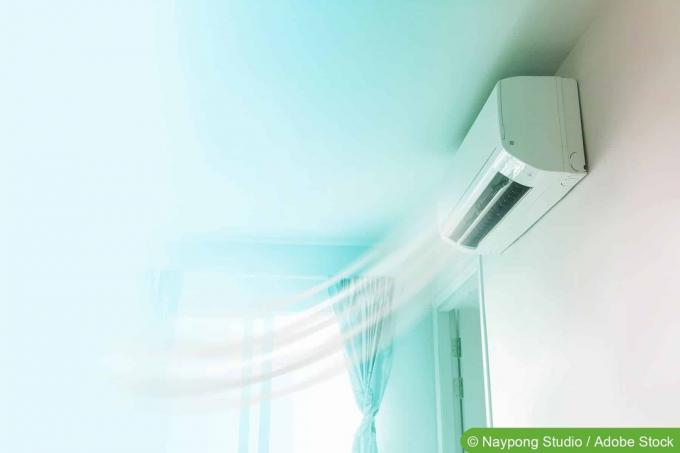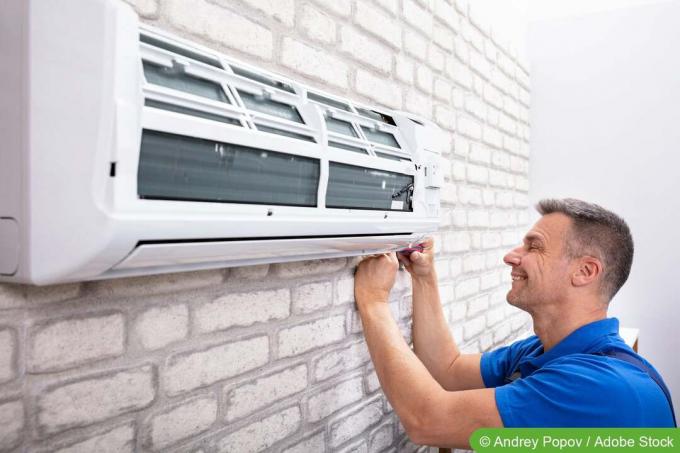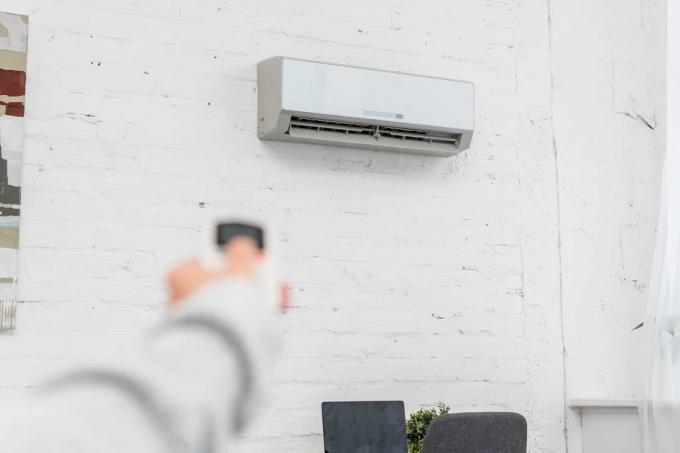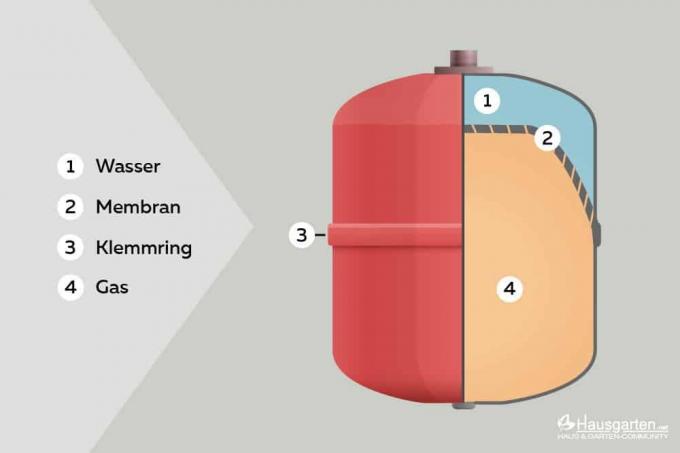

Table of contents
- BTU/hr and watts
- Calculate the cooling capacity of the air conditioning system
- Factors influencing cooling performance
- frequently asked Questions
If you want to buy an air conditioner, you should know the required performance. This is often given in BTU/h. You can find out what this is all about and how you can easily calculate the cooling capacity of an air conditioning system in our guide.
BTU/hr and watts
BTU/hr stands for "British Thermal Unit" and describes the power required to heat one pound of water (453.59 ml) by 1°F. This value is measured from 39°F (3.89°C) because water reaches its highest density at this temperature. In order to get a better overview of the cooling capacity, the unit BTU/h can easily be converted into the watt unit, which is more common in this country. This works as follows:
- 1,000 BTU/hr = 293.17W

That means if you are looking for an air conditioner with a cooling capacity of 9,000 BTU/hr, it has 2,638.53 W, which is often offered as a 2,600 or 2,650 W model. Of course, this also works in the other direction. All you have to do is follow this formula:
- (Cooling capacity in W/293.17) x 1,000 = Cooling capacity in BTU/hr
- (2638.53/293.17W) x 1000 = 9000 BTU/hr
Calculate the cooling capacity of the air conditioning system
In order to determine the optimal cooling capacity for your premises, you must calculate the existing cooling load. The following rule of thumb has proven useful for this purpose:
- Room size in square meters (m²) x solar radiation and insulation factor in W = cooling load in W
While the room size can be measured quickly, the solar radiation and insulation factor is not so easy to determine. For this reason, these guideline values are used in most buildings:
- 60 W: good insulation, low solar radiation
- 75 W: sufficient insulation, higher solar radiation
- 100 W: low insulation, very high solar radiation

You can use these values to quickly determine the cooling load in your living space. The cooling load indicates how high the cooling capacity of the air conditioning system must be. We have prepared a sample calculation for you. This example is a 30 square meter room with a cooling load of 75 W, for which we want to determine the required cooling capacity:
- Cooling load: 30 m² x 75 W = 2,250 W
Now use this value with the conversion formula described above to calculate the cooling capacity of the air conditioning system in BTU/h:
- (2250W/293.17W) x 1000 = 9407.53 BTU/hr
A cooling capacity of 9,407.53 BTU/h is required to bring the sample room to a comfortable temperature. Corresponding models with 9,400 to 9,500 BTU/h are offered.
Tip:
If you need to cool more than one or convoluted rooms, it is advisable to use several devices. This allows a larger area to be efficiently cooled.
Factors influencing cooling performance

In addition to the size of the room to be cooled, there are other factors that can have a significant impact on the cooling capacity of the air conditioning system. In most cases, these are objects or people who also generate heat, which must be taken into account when determining the required cooling capacity. You simply have to add these elements to the actual result in order to obtain the necessary cooling performance. These include, for example:
- Person: 100 to 200 W
- Window: 150W
- Ceiling heights from 240 cm: 6 W per 10 cm
Of course, there are still elements that reduce the required cooling capacity. They are difficult to calculate, but have a significant effect on the room temperature. This includes:
- sun protection films
- fans for air circulation
- carpets remove over summer (store lots of heat)
- bright wall colors (store less heat)
A notice:
Electrical devices that generate heat, such as laptops or lamps, cannot be included in the general calculation. To do this, use the device power and add it to the total value.
frequently asked Questions
Rooms without air conditioning can be effectively cooled by using them during lunchtime and in the afternoon roller shutter and use curtains and close windows and doors. As a result, the sun's rays and heat do not reach the premises unhindered. Soaking towels, sheets, and other fabrics in cold water, wringing them out, and hanging them up in the room can also help. The humidity cools the room down.
Be sure to keep doors and windows closed during use to prevent further heat from entering the room. In order to enable the device to work optimally, it is also important that the exhaust and intake connections are free. Furthermore, the air conditioner should not be behind an obstacle to allow an unhindered flow of air.
Clogged or contaminated air conditioning systems have a significantly poorer performance. This has a direct effect on the cooling performance, as the device has to work significantly harder to reach the target temperature. This in turn increases the electricity costs incurred, which can be prevented by regular cleaning.
 Mirko
Mirko
Learn more about warmth

Combining heat pumps with photovoltaics: experiences
Does it make sense to combine a heat pump with a photovoltaic system? Home builders are right to ask this question, because if you already rely on a sustainable heating system, it can only be right to produce some of the electricity required for operation yourself, or?

Calculate heating expansion tank | Table & Formula
How large an expansion tank in heating systems has to be and what pressure it can generate and withstand depends on various factors. The following tips and the table below show what is important when selecting a pressure equalization tank or expansion tank.

Checking the heating expansion vessel: checklist
The heater's expansion tank serves an important purpose as it absorbs excess water from the system and equalizes the pressure when necessary. In order to prevent defects, it is therefore crucial to carry out regular checks.

Faulty expansion tank: 5 common problems
The expansion tank or the pressure expansion tank is crucial for even and efficient heating. If the expansion tank is defective, for example due to a tear in the membrane, an installer often has to be called in. However, in some cases, you can fix the problem yourself.

Radiator valve is stuck | 4 tips to solve the thermostat
If the heating does not want to warm up, there is a high probability that the radiator valve is stuck. Luckily, you don't need a specialist to make it work again. Here are a few tips on how to undo the part yourself.

Change the heating thermostat and set it correctly
Changing the heating thermostat and setting it correctly is very easy, even for laypeople, with the right knowledge and the right instructions. However, there are a few factors to consider when setting it up. We reveal what is important.
